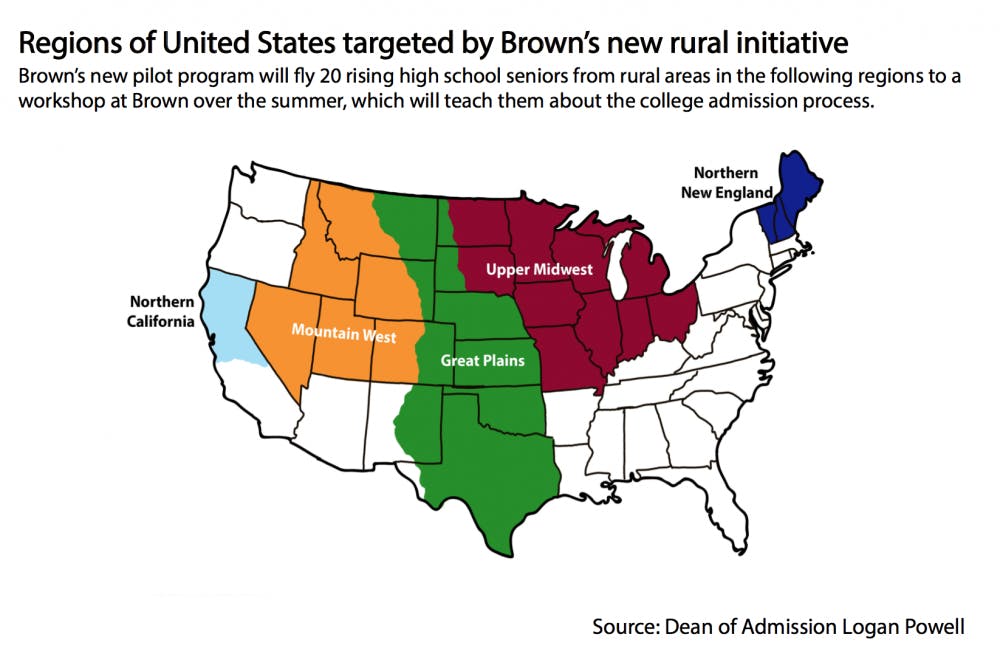This summer, the University is launching a new initiative to help prospective students from rural communities across the country learn about the college admission process and Brown, said Dean of Admission Logan Powell.
The program will be the first iteration of a two-year pilot targeting students hailing from the regions of “Mountain West, Great Plains, Upper Midwest, Northern New England and Northern California,” Powell wrote in a follow-up email to The Herald.
The Office of Admission plans to host 20 students from rural high schools on campus for the program, said Ryan Creps, regional admission officer and lead strategist of the pilot. Invited students will be rising high school seniors interested in learning about the college application process as a whole, Powell said.
“The purpose is not specifically to entice them to apply to Brown, though that may be a by-product,” he said. “The point is that we have the resources to do this, we have the interest in doing it and there’s clearly a need nationally to do this kind of work in rural areas.”
The program will take the form of “two days of workshops on everything from essay writing to completing a financial aid application,” Powell added. “This program may not be unique, but it’s certainly exceedingly rare.”
Creps added that the University plans to cover the entire cost of travel for invited students, as well as their housing in University residence halls and their food.
This initiative was formalized after Libbi Rogan ’21 — who wanted to help connect the University to her community in the Upper Peninsula of Michigan — approached Powell and Creps with the idea of helping other rural students do the same outreach in their own communities.
Rural communities are frequently overlooked in college recruitment efforts, Powell said. “There are a great many community-based organizations and outreach programs to more urban and suburban areas,” he said. “But there certainly seems to be a need to do more rural student recruitment, to go to places that colleges and universities don’t tend to go.”
Creps said that in recent years, the University has made efforts to increase programming in more remote areas across the country. For example, while the University frequently hosts information sessions in Chicago, Creps recently hosted an event in Normal, Illinois.
But in rural areas, hosting information sessions in central locations may require significant travel time for many families, Creps said. The Office of Admission frequently relies “on some of our current students from rural areas to visit rural high schools when they’re back home over break” as a form of outreach, he added.
Aaron Gettinger, a staff writer for the Hyde Park Herald in Chicago and an expert on rural education, recently wrote an article for the Hechinger Report about a general lack of college recruitment in rural communities. “I think people have to go to where the students are,” Gettinger said in an interview with The Herald. “If (institutions like Brown) are truly being aspirational in building a diverse class, they need to put serious resources into recruiting rural students.”
Students in rural areas are rarely offered information about educational opportunities beyond their immediate communities, Gettinger said. “Kids in rural America aren’t going to be seized by the idea of applying to Brown” or its peer institutions, he said. “I would imagine that real investment and targeted outreach to these students” would be positive, he added.
Individualized investments in students like the University’s pilot program are particularly important because “there are serious institutional and social setbacks in place that prevent kids from pursuing (this) kind of education,” Gettinger said. Recruiting these students “would benefit them. It would benefit the leaders of commerce and society that schools like Brown envision themselves educating.”
Furthermore, the University and its peer institutions should place as much emphasis on recruitment from rural communities as they do on recruitment from elite private secondary schools, Gettinger said. This would benefit not only the students themselves, but also the institutions. “The rural perspective is really necessary,” he said.





